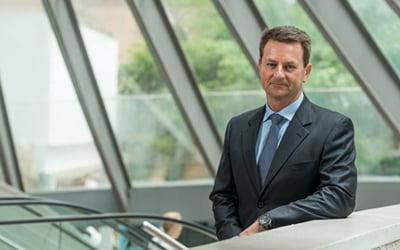 |
|
Rob GordonCEO (recently retired) of SunRice Vietnam
“I think the fact that we've touched a number of people's lives in rural Vietnam and hopefully brought some benefits to them and their families, it's probably the thing I'm most proud about.”
|
“When I think about my interactions in Vietnam, one of the first words I would use is entrepreneurial, meaning incredibly responsive and hard-working,” Rob Gordon, recently retired CEO of SunRice – one of the largest rice food companies in the world and one of Australia's leading branded food exporters – says.
Rob sees Vietnam as a country of opportunity: it has a very young population, very strong GDP growth and a strategy articulating priorities for lifting farmers out of subsistence farming into being able to learn a better living through investing in modern technologies. He also emphasises “the tremendous warmth between Australia and Vietnam”, which is very evident in every interaction and has opened opportunities for Australian businesses in Vietnam.
SunRice is one such company. It has been trading in rice with Vietnam since about 2012, but in the early days they dealt with traders and didn't have any involvement in the supply chain. The story really started in 2016 when a drought in Australia meant they needed other sources of rice to supply their global markets. Vietnam seemed like a fantastic place to start building their own supply chains.
Rob remembers a Vietnamese deputy prime minister coming to Sydney on a trade mission, calling for investments to lift growers’ income and to find ways of giving Vietnamese rice a better reputation. “So we took the wheel,” says Rob. “We thought it was an ideal opportunity to start building a presence in the supply chain.”
In 2018, SunRice purchased a disused mill in Dong Thap province, where the provincial government was incredibly welcoming, very business-like and wanted to attract investment.
SunRice rebuilt the mill and started rice exports to markets including Korea and Europe. The mill has been a success financially from day one and now over 100 people are employed.
SunRice have also collaborated with academic institutions and the Vietnamese government to train farmers in how to grow the best possible rice in the best way and to avoid excess chemical use and effectively qualify them for the export market. They have also introduced a new breed of japonica rice and low carbon farming methods. This aligns with the Vietnamese government's focus on producing higher-value rice while reducing the carbon footprint in the Mekong region.
“We've been able to do what we said we would do, which is connect smallholder growers to our high value branded markets,” Rob says. “We're building up quite a degree of trust with small holders in the Mekong.”
Rob highlights that the Vietnamese government made a very significant commitment to net zero in 2050, which includes reductions in the carbon footprint of rice growing. SunRice has a lot of know-how on how to change farming practices to reduce the carbon footprint of rice production by up to 60%. They will introduce this low carbon rice farming to the small holders they're working with in the Mekong Delta. Rob sees low the carbon rice project as a worthwhile endeavour that has the potential to impact future generations and make a difference in the lives of many people.
Overall, he says, “the fact that we've touched a number of people's lives in rural Vietnam and hopefully brought some benefits to them and their families, it's probably the thing I'm most proud about.”
